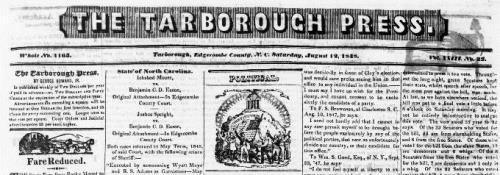
Last Friday, after 190 years, 2 months, and 5 days, the Daily Southerner of Tarboro ceased publication. The publication put down roots in Tarboro after editor and founder George Howard moved the paper from Halifax in 1826. North Carolina Historic Newspapers has digitized issues of the Tarboro’ Press (and its successors under different titles) from January 8, 1848 through December 22, 1876. These issues can be found on Chronicling America. Earlier issues of the Tarboro’ Press can be found on DigitalNC.
Over the course of its 190 years, the Daily Southerner covered all major wars, but also lesser known and long forgotten conflicts such as the Aegean Sea Anti-Piracy Operations of 1825-1828, the Second Seminole War of 1835-1842, and the Paraguay Expedition of 1859.
The world has changed in numerous ways since George Howard first began printing his paper in 1824, not the least of which is the dramatic evolution of technology. The Daily Southerner’s last communication was a tweet during the early afternoon on May 30.
Thank you to the community and to the Town of Tarboro. It has been a pleasure serving you all.
— The Daily Southerner (@DailySoutherner) May 30, 2014
